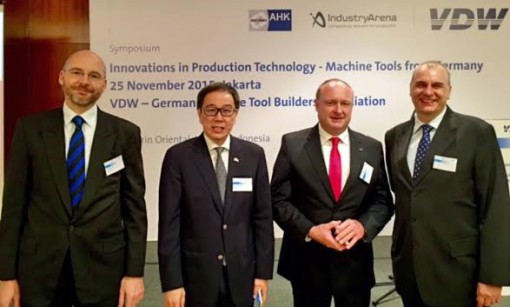 German producers of machine tools are going to intensify their business operations in Indonesia. The kick-off came at the VDW’s Technology Symposium in Jakarta held on 25 November 2015.
German producers of machine tools are going to intensify their business operations in Indonesia. The kick-off came at the VDW’s Technology Symposium in Jakarta held on 25 November 2015.
Twelve manufacturers of machine tools took the opportunity to showcase their products, solutions and services on the spot. 113 high-ranking representatives of Indonesia’s industrial sector responded to the VDW’s invitation. They came primarily from the automotive industry and its component suppliers, the aviation sector, metalworking companies and the general mechanical engineering sector.
The German companies participating were Alzmetall, Chiron-Werke, DMG Mori, Emag, FFG-Werke, Grob-Werke, Heckert, Heller, Mikron, Siemens, Schwäbische Werkzeugmaschinen and United Grinding. “With the VDW’s Symposium on ‘Machine Tools and Production Systems from Germany’ we’re here for the second time after 1992 in Indonesia, a country that offers high sales potential,” reports Klaus-Peter Kuhnmünch, the organiser of this VDW event.
In 2014, Indonesia ranked 19th in the world, with machine tool consumption of 742 million euros. The country is the third-largest market in the ASEAN region, behind Thailand and Vietnam. During the period from 2010 to 2013, the Indonesian market performed exceptionally well. Consumption doubled to more than 900 million euros. Last year, however, the market suffered a downturn of 17 per cent. The most important supplier of machine tools is Japan, which accounts for almost 60 per cent of machine tool imports. It is followed in 2nd, 3rd and 4th places by Taiwan, China and South Korea.
In 2014, German manufacturers exported machine tools worth 24 million euros to Indonesia, which corresponds to a market share of 2 per cent. As is the case in other countries of South-East Asia, the Japanese machine tool companies benefit directly from the strong presence of their own automotive industry and other customer sectors. The task for German companies is to put an end to this Japanese dominance and in future to devote more vigorous attention to the Indonesian market.
The Indonesian government’s goal is to establish processing companies on a firm footing throughout the country. This is designed to put in place the preconditions required for making Indonesia one of the leaders in Asia in terms of a manufacturing base. Although economic growth has in recent years lost a bit of its momentum, in 2014 the Indonesian economy, with a 5-per-cent rise in GDP, was still performing with notable success. This is unlikely to change in the near future.
Besides the construction industry and the food-processing sector, it’s primarily the automotive industry that’s booming in Indonesia at present. The Association of the Indonesian Automotive Industry (Gaikindo) is predicting that between 2014 and 2017 the local automotive industry will be upsizing its production capacities from 1.3 to 2.2 million units. In particular, the Japanese manufacturers Suzuki, Mitsubishi, Toyota, and most recently Honda and Nissan as well, intend to upgrade Indonesia into an export hub for the ASEAN Economic Community (AEC).
Group picture of the organisers (from the left): Holger Seubert (Head of Economic Department, Embassy of the Federal Republic of Germany, Jakarta), Prijono Sugiarto (President Director, PT ASTRA International Tbk, Jakarta), Klaus-Peter Kuhnmünch (Manager General Affairs, VDW, Frankfurt), Jan Rönnfeld (Managing Director of the German-Indonesian – Chamber of Commerce Ekonid, Jakarta) Source: VDW



